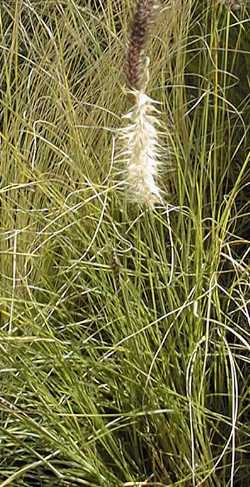Deer Grass
Scientific Name: Muhlenbergia rigens (Benth.) A.S. Hitchc.,
Synonym: Epicampes rigens, Muhlenbergia marshii, Muhlenbergia mundula
Family: Poaceae
Sunset®: 7-24
USDA: 9-11
Frost Tolerance: Hardy in Phoenix
Sun Exposure: Full sun to light shade
Origin: USA (California to New Mexico), northwestern Mexico
Growth Habits: Perennial grass, fast growing, up to 3 feet (90 cm) tall, 5 feet (1.5 m) when in bloom
Flowers: Yellow or purple flowers
Watering Needs: Moderate to little water, cannot tolerate poorly-drained soils.
Propagation: Seeds, division

Muhlenbergia mundula, Hitchcock, A.S. (rev. A. Chase). 1950. Manual of the grasses of the United States. USDA Misc. Publ. No. 200. Washington, DC. 1950.
The genus is named for Henry Muhlenberg (1753-1815), a Lutheran minister and botanist from Pennsylvania.
Deergrass is a significant basketry material to central and southern California Native Americans who utilize the flower stalks in the foundations of coiled baskets. Frequently thousands of flower stalks are needed for completion of each basket. Culms are gathered in late spring while still green, or summer or early fall when golden brown depending upon the tribe, individual family preference, and elevation of the deergrass site.
Culture:
Once established, deergrass is quite drought-tolerant. To maintain its vigor and reduce accumulated dead material, deergrass can be mowed every several years. Mowing should be in the fall, after it has gone to seed.
Propagation:
The flower stalks can be cut, bundled, and then beat over a tarp or bucket to release the seeds. The seeds are usually highly viable, and do not need special treatment to initiate germination.
Desert-Tropicals is dedicated to provide gardening advice, gardening ideas, and information about flower of all kind for landscape and collections.We try to check carefully the identification of the plants on the illustrations as well as the other information from the page, but occasionally errors do occur. if you notice anything that needs to be changed please contact us.Thanks.
© 1998-2020 Philippe Faucon, All Rights Reserved.
